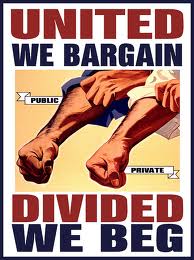I have no issue whatsoever with the McWorker, along side his McFriend, walking into the McBoss’s office and asking for a raise. And if denied, threatening that the two of them, in hopes they are valuable, will walk off the job and go to work somewhere else.
In this case, the McBoss can call the McBluff and say, “No raise for you!” and hope the McWorkers get back to McWork. Or, perhaps the McBoss, seeing the value of the McWorkers, will relent and approve the raise and everyone is happy.
In other words, uniting in the pursuit of self interests is fine. As long as the rules are fair for everyone. And when it comes to unions, the rules are most certainly not fair:
“The most glaring examples of union favoritism under state laws,” notes a 2012 U.S. Chamber of Commerce report, “tend to occur in criminal statutes and allow individuals who engage in truly objectionable behavior to avoid prosecution solely because they are participating in some form of labor activity.”
Pennsylvania unions now enjoy a loophole that the state’s anti-stalking law “shall not apply to conduct by a party to a labor dispute.” In Illinois, anti-stalking laws exempt “any controversy concerning wages, salaries, hours, working conditions or benefits … the making of collective bargaining agreements.”
These exemptions prove that organizing tactics used by unions can have something in common with those of stalkers – and can perhaps inflict similar emotional distress.
While a number of states have exemptions that have allowed union members to intimidate and harass, California is by far the worst actor. As in other states, it is a crime in California to interfere with a lawful business through physical obstruction or intimidation of workers or customers.
Yet California has exempted unions from this law. The negative effects were clear in 2008, when United Food and Commercial Workers Union members picketed a new Ralph’s grocery store in Fresno. They went beyond traditional picketing, harassing customers and instigating confrontations with employees on store property. When store workers finally called the police, authorities refused to come and put a stop to the union’s disruptive behavior.
The police refused to even dispatch to the site.
But it gets even worse:
California also has a host of exemptions that allow union members to violate the property rights of private citizens. The 2008 Researcher Protection Act makes entering the residences of academic researchers to interfere with their work a crime. Sounds reasonable. Yet this doesn’t apply to union members. They can invade a professor’s home in California and it’s not a crime – so long as the invader is “engaged in labor union activities.”
And even worser:
Labor bosses have even deemed it necessary to get legislators to grant unions exemptions from laws against sabotage. Wisconsin’s state law against sabotage exempts unions, so as to not curtail their organizing activities. The fact that anti-sabotage laws might be construed as an impediment to union organizing says more about union organizing efforts than anything else.
Yet, in 2011, union members were alleged to have sabotaged equipment belonging to supporters of Governor Scott Walker’s labor reforms. In New York and New Jersey, during a labor dispute between Verizon and the Communications Workers of America, the telephone company contacted the FBI to investigate allegations of sabotage. The company reported equipment being stolen, fiber-optic lines cut and an office heating system tampered with.
During a union organizing effort in Ohio, the owner of one non-union electrical services company had his tires slashed and rocks thrown at his windows. One of his employees was assaulted. The owner was himself shot in the arm while confronting a person who was vandalizing his car on his property. Other owners of non-union shops experienced similar harassment and intimidation. When the Associated Builders and Contractors called on unions to halt such odious behavior, the unions responded that their actions were perfectly legal.
We all should have the right to bargain for our services and our compensation. We should be able to grieve our differences when they occur. But we should all be safe from threats, violence, theft and assault.

